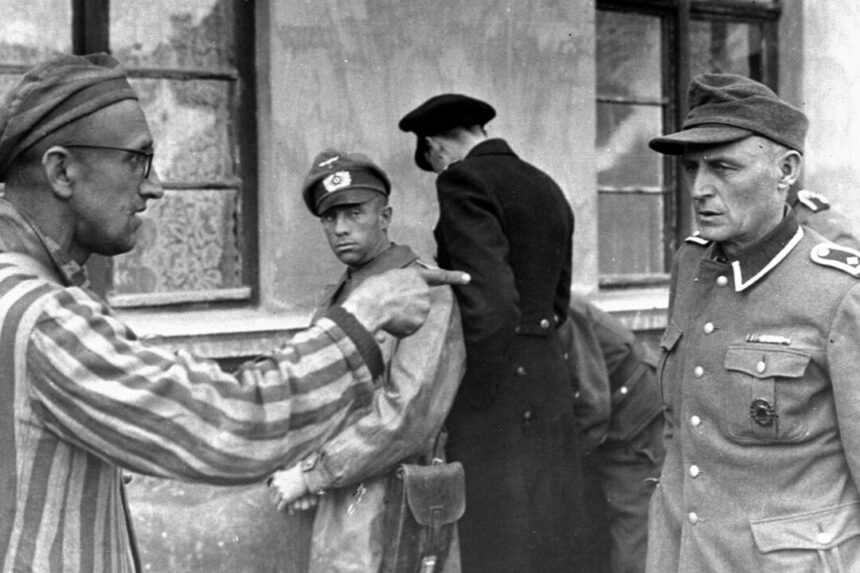Commentary
Evans uses a biographical approach. The author not only focuses on Hitler but also provides concise biographies of twenty-one individuals in his circle, from key figures like Göring, Himmler, and Goebbels, to “enforcers” like Heydrich and Eichmann, and those who served as “tools,” including filmmaker Leni Riefenstahl.
Evans excuses no one, including Albert Speer, who “somehow persuaded the judges at … Nuremberg after the war that he had been unaware of Nazism’s crimes.” Evans adds that Speer, who postured in his memoirs as an “apolitical architect,” supplied “a persuasive excuse for millions of Germans who had lived under the Third Reich.”
“To be a useful assistant in the running of a totalitarian state, it is not enough that a man should be prepared to accept specious justification of vile deeds; he must himself be prepared actively to break every moral rule he has ever known if this seems necessary to achieve the end set for him.”
The rogues’ gallery of individuals in “Hitler’s People” broke every “moral rule” to serve Hitler and behaved, in Hayek’s words, “completely unprincipled and literally capable of everything.”
“Evildoing,” Solzhenitsyn wrote, “also has a threshold magnitude.” He continued,
“A human being hesitates and bobs back and forth between good and evil all his life. He slips, falls back, clambers up, repents, things begin to darken again. But just so long as the threshold of evildoing is not crossed, the possibility of returning remains, and he himself is still within reach of our hope.”
Solzhenitsyn explained when “through the density of evil actions, the result either of their own extreme danger or of the absoluteness of his power,” a person crossing that threshold “has left humanity behind, and without, perhaps, the possibility of return.”
In his historical research, Evans analyzes primary sources to reveal how the unthinkable occurred and what we can learn from the normalization of “perverted morality.”
Evans is clear about why we must learn: Hitler’s people “were not psychopaths; nor were they deranged, or perverted, or insane.”
Evans continues, “Apart from flying in the face of the evidence, thinking of them as depraved, deviant, or degenerate puts them outside the bounds of normal humanity and so serves as a form of exculpation for the rest of us, past, present and future.”
Hitler’s people were not those “who existed on the margins of society, or grew up beyond the social mainstream. In most of their life, they were completely normal by the standards of the day.” They “shared the conventional cultural attributes of the German bourgeoisie, were well-read, or played a musical instrument with some proficiency, or painted, or wrote fiction or poetry.”
If you want a historian who places all the blame on Hitler, you won’t find it in Evans. “German institutions and traditions and, more generally, the German people themselves” are examined and found responsible. Hitler did not merely “seduce people into following him: it was his followers who inspired him to lead them.”
That said, Evans’s views are nuanced. He does not believe “that exterminatory antisemitism, subservience to authority, lust for conquest, militarism and similar characteristics, were hard-wired into the Germans’ sense of national identity.”
Hitler and his followers may have created the external circumstances, but it was the German people who were responsible for their internal state, with coal fires burning in their mental landscapes.
The thought of how Americans would cope with a major economic crisis, similar to the 1930s, often haunts me. Many Americans have their own coal fires smoldering as respect for the rule of law and constitutional principles diminish.
Historian Evans notes that the Nazi regime was not solely a dictatorship supported by the people. Different age groups had varying levels of support for the regime, with younger individuals being more influenced by Nazi propaganda and indoctrination.
Hitler promised to create a unified people’s community, excluding Jews, in times of crisis. However, without unity around constitutional principles, totalitarian leaders can exploit division and uncertainty.
Building a nation around the vision of one person and a forced common purpose can be dangerous, as a purposeless population may seek meaning in following a tyrant.
Evans emphasizes that the unifying force the German people found was hatred, fueling the Nazis and ultimately leading to destruction. Hatred, if left unchecked, can destroy any nation.
The lessons from history, as presented in “Hitler’s People,” serve as a stark reminder of the consequences of allowing hatred to prevail. It is crucial for all individuals to learn from these lessons to prevent such atrocities from happening again.
Source link






